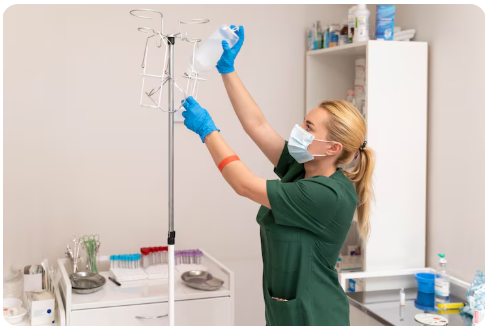The immune system is a complex network of cells, tissues, and organs that work in concert to defend the body against pathogens. Its effectiveness is highly dependent on a variety of essential nutrients, with iron playing a particularly crucial role.
When the body is deficient in iron, its ability to mount a strong and effective immune response is compromised. For individuals with iron deficiency anemia, a condition where the body lacks enough healthy red blood cells, a targeted intervention is often necessary.
Iron infusion treatments provide a direct and efficient way to replenish iron stores, thereby significantly boosting the immune system’s function and overall defensive capabilities. This article explores the specific ways in which this therapy supports and strengthens the body’s natural defenses.
Iron’s Role in Immune Cell Production
Iron is an essential cofactor for the proliferation and maturation of various immune cells, including lymphocytes, which are the main warriors of the adaptive immune system. Without adequate iron, the production of these cells can be significantly hindered.
This deficiency can lead to a reduced number of T-cells and B-cells, compromising the body’s ability to recognize and neutralize specific threats like bacteria and viruses.
Iron infusion treatments directly address this by supplying the necessary building blocks for a robust and well-stocked immune cell army.
Enhancing Phagocytic Activity
Phagocytes, such as macrophages and neutrophils, are the “first responders” of the innate immune system. They engulf and destroy invading microorganisms. Iron is vital for the proper functioning of these cells.
It’s a key component of enzymes that produce reactive oxygen species, which are used to kill pathogens once they have been engulfed. An iron deficiency can impair this process, making phagocytes less effective at clearing infections.
By restoring iron levels, iron infusion treatments enable these cells to perform their duty with maximum efficiency, ensuring a swift and decisive response to invaders.
Supporting Enzyme and Protein Function
Beyond cell production, iron is a critical component of numerous enzymes and proteins that are directly involved in immune function. For example, it is part of ribonucleotide reductase, an enzyme required for DNA synthesis in rapidly dividing immune cells.
It is also essential for myeloperoxidase, an enzyme in neutrophils that generates hypochlorous acid, a potent antimicrobial agent.
Without sufficient iron, the synthesis and activity of these vital components are compromised. Administering iron infusion treatments ensures that all these intricate biochemical processes can operate at their full potential.
Improving Cytokine Production
Cytokines are small proteins that act as messengers between immune cells, coordinating the overall immune response. The production and signaling of these crucial molecules can be negatively affected by an iron deficiency.
When iron levels are low, the body’s ability to regulate inflammation and communicate effectively between different parts of the immune system is diminished.
This can lead to a less coordinated and less effective defense. By correcting the deficiency, iron infusion treatments help restore proper cytokine signaling, allowing for a more harmonious and powerful immune response.
Combating Chronic Inflammation
Chronic, low-grade inflammation can be a sign of a compromised immune system and can contribute to various health issues. Iron deficiency itself can lead to a state of chronic inflammation. By replenishing iron stores, iron infusion treatments help to regulate the inflammatory response.
This allows the immune system to return to a more balanced state, where it can focus its energy on fighting off acute threats rather than being bogged down by persistent, low-level inflammation.






